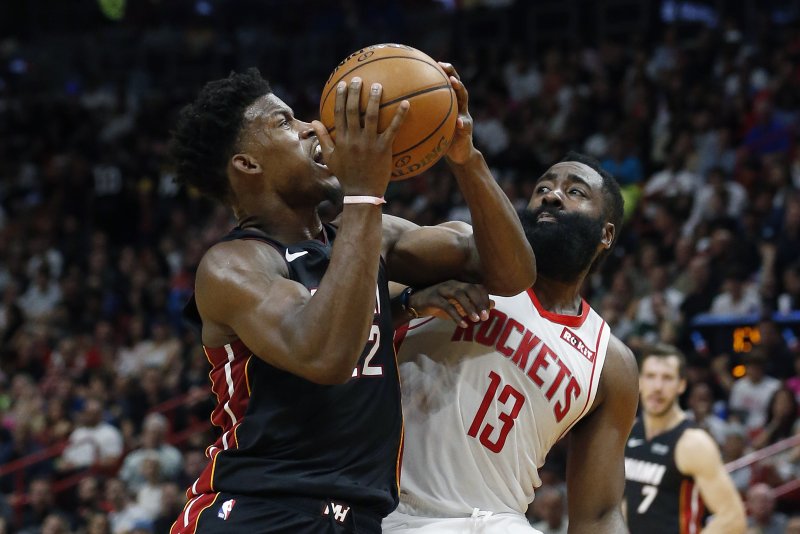Thanks to the NBA's bubble this summer, researchers were able to test theories showing that travel, at least partially, is what gives home teams the advantage at both scoring and rebounding. Photo by Rhona Wise/EPA-EFE
Dec. 11 (UPI) -- Home court advantage is real, but researchers have long argued over the origins of the phenomenon.
More recently, however, a consensus has begun to emerge: basketball players are at their best when they get a good night's sleep in their own bed -- or at least their own time zone.
According to new analysis by a team of researchers at Oregon Health and Science University -- published Friday in the journal Scientific Reports -- shooting performance is impacted by cross-time-zone travel, while rebounding is influenced by any kind of travel.
Normally, it's not possible to utilize a control group when studying differences in performance among home and road teams in the NBA, but the pandemic-necessitated "bubble" provided researchers a unique opportunity to study games without a home court advantage.
"I'm a big sports fan, and I always wanted to look at how travel -- and potentially jet lag and sleep disturbance -- impacts sports performance," lead study author Andrew McHill said in a news release.
"When the NBA suspended its season, and then started this bubble experiment in Orlando, I realized it was an opportunity to do what I'd been thinking about for a long time," said McHill, an occupational health scientist at OHSU.
The analysis conducted by McHill and his colleagues showed that when travel is a non-factor, players play better.
"Everyone was shooting better," McHill said. "There was a lot more scoring. In any given game, you didn't have one team that was shooting worse like you normally would."
During last season's playoffs, players, coaches and staff ate, slept, practiced and played on-site inside the Orlando-based bubble. Teams arrived early to quarantine and acclimate to the environs, so by the time of the first tipoff, everyone's body clocks had normalized.
When researchers looked at regular season games that took place prior to the pandemic, they found cross-time-zone travel had a negative impact on shooting performance. Shooting performance wasn't impacted by travel within a team's home time zone.
The findings suggest the shooting disadvantage suffered by away teams is caused by disruptions to players' body clocks, or circadian rhythms, which influence the suprachiasmatic nucleus of the brain's hypothalamus, the region responsible for fine motor control movements -- like shooting a basketball.
Rebounding performance, however, was negatively impacted by any kind of travel, big or small. Because rebounding requires effort more than precision and finesse, researchers suggest players who sleep in their own beds, as opposed to a hotel, are better prepared to box out their less-well-rested opponents.
Researchers suggest it's possible some other factors contributed to the uptick in shooting performance inside the bubble.
Some NBA players remarked that they found their depth perception was better in the smaller, fan-free arena.
An earlier study also found that European soccer teams also became more efficient shooters in stadiums without fans, despite continuing to travel.
As the NBA teams prepare to resume a more traditional travel and playing schedule for the 2020-2021 season -- which starts on Dec. 22 -- McHill suggests teams can make adjustments to minimize home court advantage.
"To best adapt to a new time zone, you'll want to arrive at your 'away' destination as soon as possible," he said. "This study may suggest it's worth getting acclimated to your new time zone as quickly as possible. It may mean flying after the game, even though it's late."
"This type of schedule would have to be evaluated on a game-by-game basis, as you also don't want to impact sleep too greatly," McHill said. "It's a fine balance that still needs to be worked out."
It's not the first time scientists have identified the importance of sleep for an NBA player's performance.
A study published in 2017 found NBA players who penned late-night tweets were more likely to suffer a performance decline if they had a game the following day.















